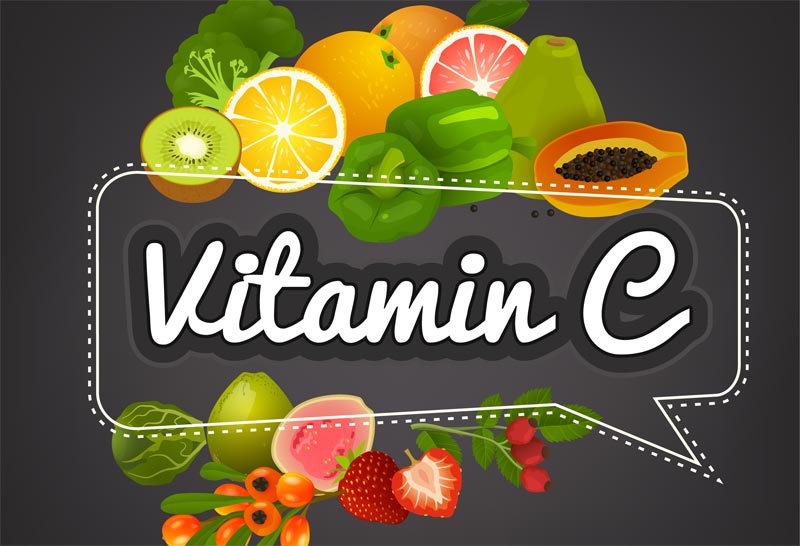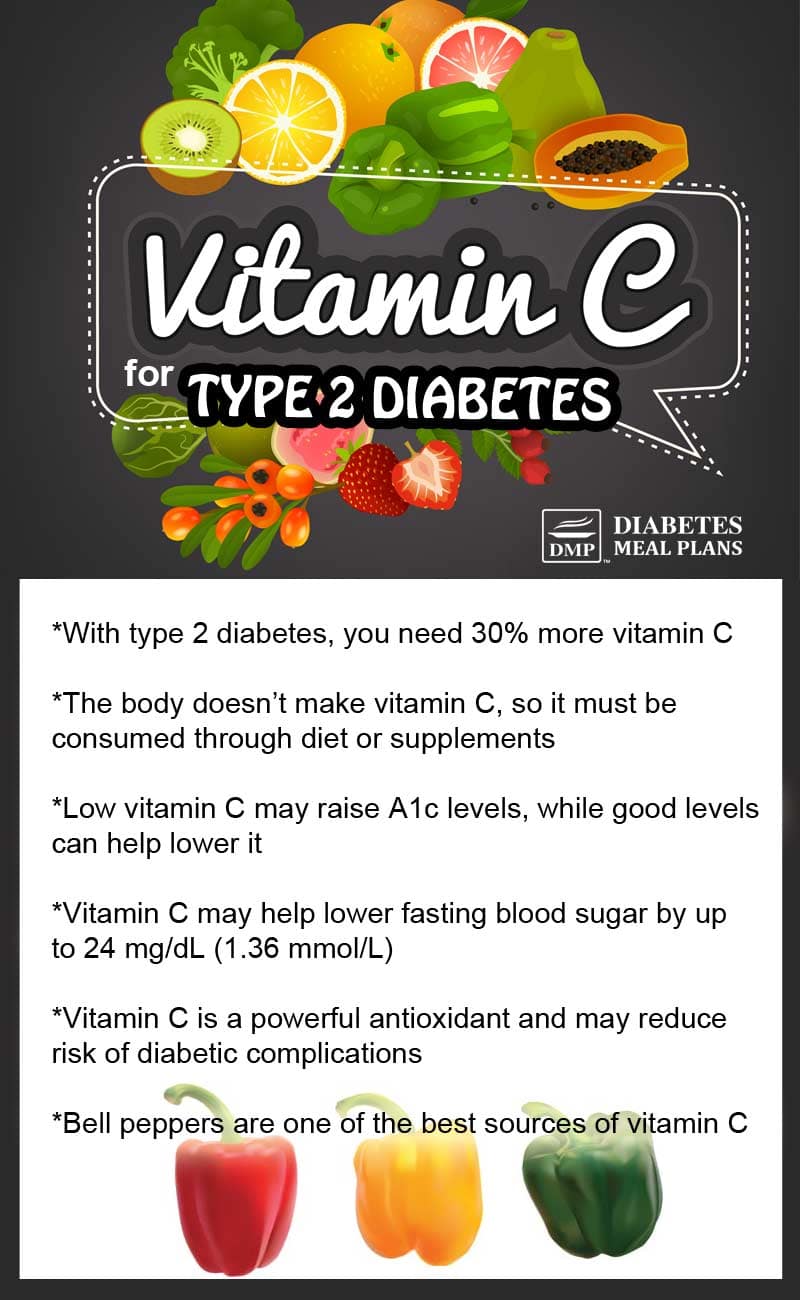
- lower blood sugar and A1c levels
- reduce oxidative stress caused by high blood sugar
- decrease inflammation
Vitamin C and Diabetes
People with diabetes are more likely to have low levels of vitamin C. Having diabetic complications can also increase your need for vitamin C. And interestingly, if you have lower levels of vitamin C, this may promote higher A1c levels.
Keep reading to discover more about the role of vitamin C in the body, supplements, foods and how vitamin C can be of benefit in your diabetes management routine.

The Role of Vitamin C
Vitamin C, also known as ascorbic acid, is a water-soluble vitamin.
Vitamin C is an essential cofactor in many enzyme reactions in the body, including:
- Aiding with the synthesis of collagen, carnitine, and catecholamines
- Being a powerful antioxidant
- Promotes a healthier immune system
- Helps regenerate other antioxidants such as vitamin E
- Involved in metabolism of cholesterol and bile acids
- Helps enhance the bioavailability of iron from foods
Vitamin C is not made in the human body, which means you need to consume it through food or supplements.
Being that vitamin C is the dominant antioxidant found in the blood and tissues throughout the body, it’s no surprise that it’s best known for its powerful antioxidant capabilities.
Vitamin C: Daily Requirements for Type 2 Diabetes
The recommended daily allowance (RDA) for the general adult population is 75 mg for women and 90 mg for men, with an upper limit of 2000 mg daily.
However, for people with type 2 diabetes and prediabetes, you may need more.
According to research, people with diabetes have approximately 30% less vitamin C circulating in their blood compared to the general population.
If you have type 2 diabetes along with complications, you may even have lower levels compared to those without diabetes related complications. And that’s not great because large studies have found that vitamin C levels and A1c levels are associated.
In fact, as your vitamin C level declines researchers have found that A1C level increases.
So why are your vitamin C needs higher when you have diabetes?
Oxidative stress caused by increased free radical production is common in type 2 diabetes. When your body is in a chronic state of oxidative stress, there is an unseen battle going on between pro-oxidants and antioxidants.
As the battle rages on in your body, your level of antioxidant resources gets depleted, leading to a decline in your antioxidant levels (remember, vitamin C is one of the body’s central antioxidants).
On top of this, when your blood glucose levels are elevated, vitamin C can’t be absorbed into cells as efficiently and you can have increased urine losses.
Therefore, as a person with type 2 diabetes, your requirements for vitamin C are closer to 95 mg for women and 120 mg/day for men (~30% higher than the RDA), especially if you have poorly controlled diabetes.
Vitamin C and Blood Sugar Levels
There is some evidence that shows taking vitamin C supplements may assist with better glucose control.
For instance, a large review concluded that vitamin C supplementation lowered fasting glucose levels by 20 mg/dL (1.11 mmol/L) and reduced A1c by 0.46%.
Another review showed vitamin C supplementation reduced random glucose levels by 8 mg/dl (0.44 mmol/L) and fasting level by 24 mg/dL (1.36 mmol/L).
While these studies do indicate that vitamin C supplementation may improve glucose levels, one of the issues is, all the trials provide participants with differing amounts of vitamin C, ranging from 100 to 1000 mg/day, and for differing periods of time.
Therefore, it is difficult to say how much is required to lower glucose and how long you need to take it to see an effect.
Vitamin C as an Antioxidant
Vitamin C is a potent antioxidant. The role of antioxidants in the body is to neutralize and control free radicals – cells that cause damage (oxidative stress) and increase the likelihood of diabetic complications.
Antioxidants can help prevent and repair free radical damage caused by oxidative stress, which in turn improves insulin secretion and glycemic control.
Antioxidants found in whole fruits and vegetables, including vitamin C, can help prevent diabetes complications.
However, there is little evidence to support that antioxidant supplements have the same effect. Most likely because vitamin C works as part of an elaborate network of antioxidants all working synergistically together to exert their benefits.

Vitamin C Supplementation Dosage & Side Effects
Vitamin C supplements come in various forms – ascorbic acid, sodium ascorbate, calcium ascorbate and a combination of any of these forms.
Ascorbic acid is the preferred form of vitamin C, as it is inexpensive and has the same absorption capability as the naturally occurring vitamin C in foods.
You can purchase vitamin C supplements in tablet, powder and liquid form.
Are vitamin C supplements safe?
Overall vitamin C supplements are considered safe.
Consuming 30 to 100 mg/ day supplemented vitamin C results in a steady increase in blood levels of vitamin C. At 200 mg/ day, complete absorption is generally achieved. Once saturation of tissues is achieved, any vitamin C your body doesn’t utilize is excreted in urine.
Interestingly, studies indicate vitamin C supplements (400 mg/day or more)reduce risk of fatal and nonfatal coronary heart disease in people with diabetes. However, other studies suggest levels equivalent to, or over 300 mg/d are associated with the potential for an increased risk of cardiovascular disease in individuals with type 2 diabetes.
With this in mind, sticking to around 200 mg/ day is probably best practice.
One side effect of increasing vitamin C rapidly can be diarrhea. It’s often temporary but something to be aware of initially.
Another thing that has been mentioned above, and something researchersagree upon, is that in most cases, consuming a diet that includes plenty of vitamin C-rich food provides significantly more benefit than supplementation alone. And consuming foods is obviously safe.
So the message here is: eat plenty of fresh produce to get your daily dose of vitamin C, even if you do intend on supplementing.
Sources of Vitamin C
Vitamin C is naturally found in many fresh vegetables and fruits – foods that are great as part of your diabetic diet!
Rich sources of vitamin C include (for 1 cup):
Vegetables:
- Yellow bell peppers – 341.3 mg
- Red bell peppers – 203.8 mg
- Green bell peppers – 217.6 mg
- Mustard spinach – 195 mg
- Broccoli – 106 mg
- Brussel sprouts – 100 mg
- Kale – 87 mg
Low carb fruits (1/2 cup):
- Lemon – 112.4 mg
- Strawberries – 89.4 mg
- Grapefruit – 85.1 mg
Since the vitamin C content of food is reduced by extended shelf life and cooking, raw vegetables and fruits provide the most vitamin C.
Incorporating Vitamin C into Your Daily Plan
By focusing on eating one serving of fruit and at least four servings of vegetables daily, you can easily consume more than 200 mg of vitamin C.
Remember to focus on raw foods instead of cooked foods, due to the losses of vitamin C in the heating process.
However, if you prefer cooked vegetables, steaming preserves more vitamin C compared with boiling or roasting.
A large salad that includes the foods and amounts listed below provides 200 mg of vitamin C and only 12 grams of net carbohydrates, which fits well within your goal of 50-80 grams of carbs daily.
- 2 cups spinach (300 mg vitamin C, 1 gram net carbohydrate)
- Half cup red peppers (100 mg vitamin C, 3 grams net carbohydrate)
- 1 medium tomato (20 mg vitamin C, 3 grams net carbohydrate)
- Half cup of strawberries (50 mg vitamin C, 5 grams net carbohydrate)
Another suggestion would be raw broccoli, cauliflower and green peppers with hummus or cottage cheese.
Eating one cup of a combination of these raw vegetables provides approximately 70 mg of vitamin C and only 4 grams of net carbs. This is more than half your daily requirement in a quick and easy snack option!
Conclusion
Vitamin C can help reduce oxidative damage and improve blood sugar and A1c levels, along with helping to boost your overall health.
Your need for vitamin C with type 2 diabetes and prediabetes can increase so ensure you get adequate intake each day by eating lots of fresh produce, or by adding an additional supplement.
Please pin, tweet or share this info to help others – thanks!
By
Full link: https://diabetesmealplans.com/13904/vitamin-c-and-diabetes/?awt_l=6pFNL&awt_m=3WH4LSCFXZ2K8wV



